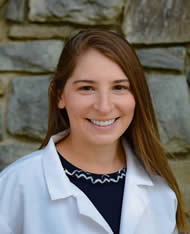New Faculty Profiles
Welcome!
Jessica C. Hargarten, PhD
Tania Wong, PhD

Dr. Jessica C. Hargarten received her B.S. from the University of California, Davis and her Ph.D. from the University of Nebraska-Lincoln. She did her postdoctoral training at the National Institute of Allergy and Infectious Diseases (NIAID) and the NIH Clinical Center under the mentorship of Dr. Peter R. Williamson, MD/PhD in the Translational Mycology Section where she began to uncover the genetic and immunologic factors underlying human susceptibility to invasive fungal disease. Her work also identified the predominant pathway underlying a post-fungal infection inflammatory syndrome and a new treatment modality for cryptococcal- post-infectious inflammatory response syndrome in patients. After her training, she moved to Rutgers where she is an Assistant Professor in the Department of Pathology, Immunology, and Laboratory Medicine and member of the Center of Immunity and Inflammation. Dr. Hargarten's long-term research goal is to defineand interrogate human genetic, immunologic, and lifestyle factors that skew immune responses towards severe disease following fungal infections in previously healthy populations in order to inform precision medicine approaches to care and treatment. Her lab utilizes relevant in vivo and in vitro models of disease and clinical samples to further determine the role of these genes (particularly MTOR pathway genes) in immunity and susceptibility to disease caused by the fungus Cryptococcus. Her research is currently supported by extramural funding from NIAID.

Dr. Wong obtained her PhD from the University of Melbourne, Australia.
There, she focused on effector proteins that are secreted by
gastrointestinal pathogens and how they interfere with host cell
signaling pathways involved in inflammation and cell death to establish
infection. Following the completion of her PhD in 2016, she joined the
laboratory of Professor Alice Prince at Columbia University where she
continued to investigate the interaction between the host and bacterial
pathogens, particularly those that are multidrug-resistant. She has
gained experience with various mouse models of pulmonary and skin
infection. A major focus of her research, for which she was awarded a
K99/R00 grant from the National Heart, Lung, and Blood Institute
(NHLBI), is the host-pathogen metabolic interplay, which shapes the
infection outcome. She is interested in understanding how opportunistic
pathogens such as Klebsiella pneumoniae and Staphylococcus aureus
subvert the host metabolic response and how this in turn dictates the
immune response. In addition, she aims to manipulate the immunometabolic
response to promote bacterial clearance via dietary intervention and
changes in the microbiota. Dr. Wong joined the Center for Immunity and
Inflammation at Rutgers Health New Jersey Medical School as an Assistant
Professor and Chancellor Scholar in the Department of Microbiology,
Biochemistry & Molecular Genetics in April 2024.

